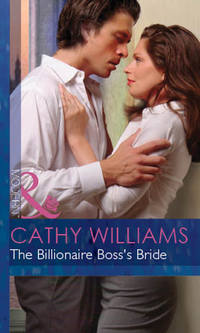
Полная версия
To Tame a Proud Heart
He sat on the edge of her desk, waiting for her to sit down, then he leant towards her. ‘I say this for your own benefit. The people with whom you’ll be mixing don’t come from such a rarefied background as you do.’ He reached out to finger the lapel of her expensive shirt. ‘Too much of this and you might find yourself distanced by a group of very nice people indeed.’
She didn’t pull away from his touch, but she wanted to. Instead, as he strolled back into his office, she found that her body had become rigid, and she only began to relax as she sorted out the stack of typing which lay at the side of the computer.
At twelve o’clock he emerged from his office and informed her that he would be out for the rest of the day. She watched as he slipped on his jacket, adjusted his tie, and breathed a sigh of relief when the door closed behind him.
He made her tense and it wasn’t simply due to the insults which he had flung at her. There was something watchful about him—something that stirred a certain uneasy wariness in her. He was like a shark, circling the water around her, content to watch, but she would do well to remember that sharks bit.
He had left her enough work to fill her time until five o’clock, but in fact she stayed on until nearly six-thirty, familiarising herself with his filing system, and familiarising herself also with some of the books on the shelf which he had informed her would have to be read, digested and memorised.
She had no idea how much of that had been said because he contemptuously believed that she would never manage such a task, but if she was to stay working with the loathsome man then she would make damned sure that by the end of her stint he would have to swallow everything he had said.
Her father was not at home when she got back—tired, but oddly elated at having spent the day doing something productive—but Rupert was. Bridie had let him in and Francesca found him in the sitting room, on his second glass of gin and tonic.
He looked at her as she walked in and said without preamble, ‘Nasty rumour has it that you’ve got a job.’
Francesca looked at him and grinned. She was very fond of Rupert Thompson. She had known him casually for two years, but it was really only in the last seven months that they had become close, much to her father’s disgust. He had no patience with men like Rupert. He thought that he should buckle down and find himself a job or, failing that, join the Army—as if joining the Army would suddenly change sunny-tempered Rupert into an aggressive work-machine.
The only thing that held him in check was his daughter’s repeated reassurance that nothing was going on between them. Rupert was fun. He didn’t want her as a passionate lover and the feeling was mutual.
She took off her coat, tossed it onto a chair and went across to the bar to pour herself a glass of mineral water.
‘Nasty rumour,’ she said, sitting down on the sofa, kicking off her shoes and tucking her feet underneath her, ‘is right.’ She looked at him. ‘You could always follow my example,’ she added, and he grinned at her infectiously.
‘And lose my reputation? Never.’
As it happened, he did have a job of sorts, but in typical Rupert-style he had long ago decided that delegation was a talent that was much underrated. And, in fairness, it worked for him. His parents had died ten years ago, leaving him a fortune, along with a vast estate which he had happily left in the efficient hands of the managers who had looked after it from the year dot.
He signed things that needed his signature, spent enough time at his country home to ensure that things were being run profitably, and there his input ceased. He made sure that all his employees were treated well, received unstinting loyalty in return, and cheerfully had his good times on some of the immense profits that came his way.
‘So tell all,” he commanded, settling back comfortably with his drink, and Francesca obliged, carefully editing out the unpleasantness of her interview. She wasn’t given to confiding private feelings to other people—a legacy, she had always assumed, of having been the only child of a single-parent family.
‘Kemp,’ Rupert murmured thoughtfully. ‘Kemp, Kemp, Kemp. I know that name.’
‘Their electronic stuff is all over the country, Rupert,’ Francesca said drily. ‘And they’re branching out all the time,’ she heard herself saying. ‘They’ve moved into Europe and are hoping to capture the Far East fairly soon.’ One day, she thought suddenly, and I sound like an advertising brochure. Had Oliver Kemp been that successful in influencing her thoughts? She found the idea of that slightly disconcerting.
‘No, no, no.’ He waved aside the explanation. ‘What I mean is this—I’ve heard of that man personally.’
‘Really?’ She felt a sudden rush of curiosity which, she told herself, she had no intention of satisfying. Oliver Kemp was an arrogant bastard, and whatever he did in his private life had nothing to do with her. She would work for him because a combination of pride and guilt would make her, at least for the time being, but beyond that her interest stopped.
Rupert, immune to subtle shifts in atmosphere, blithely ignored this one and continued in the same thoughtful voice, ‘Oliver Kemp. I’ve seen him around.’
‘You’ve seen most people around,’ she pointed out. ‘You’re hardly one of life’s shrinking violets, are you?’
He laughed, pleased at that. ‘Good-looking chap,’ he said, draining his drink and eyeing the empty glass meaningfully. She ignored the hint. As far as she was concerned he drank too much anyway, and she had no intention of assisting the situation.
‘You can have some mineral water, Rupert,’ she said eventually, and he sighed in resignation.
‘Too much of this stuff is bad for you,’ he said when she handed him the glass of water. ‘Haven’t you heard that?’
‘No, and nor have you.’
‘A glass of wine, according to the experts, does wonders for some organ or other. Heart, I believe.’
‘I would sympathise if your input was restricted to one glass per day.’
‘Oliver Kemp,’ he said, not commenting on that one, ‘was in the gossip columns not too long ago. That’s why the name rings a bell. Don’t you ever read the gossip columns?’
‘Too trivial,’ she replied airily, and he laughed with great humour.
‘Ever since they announced that we were about to become engaged?’
‘Stupid people.’ Her mouth tightened as she remembered all the fuss. One casual shot of them leaving a nightclub in London had been enough to propel them into an item, and it had been that silly drama which had led to all her father’s unfounded suspicions that his daughter was about to do something utterly ridiculous.
‘Well, they had their facts right about Oliver Kemp. He’s engaged to a woman—Imogen something or other. There was a picture of them taken at their engagement party not too long ago.’
‘Oliver Kemp is engaged?’ Her voice was high and incredulous, and Rupert looked at her with some surprise.
‘Sattler,’ he said, nodding, delighted at this triumph of memory. ‘Imogen Sattler. She’s one of the city’s top businesswomen. They squeezed in a few lines of background on her. Born up north somewhere.’ He frowned. Instant recall was not one of his strong points and he didn’t pursue it. ‘Girl makes good, type of thing. You know what I mean—parents not well off, daughter very clever, gets into Oxford University, ends up sitting on the board of one of the top companies in the country.’
That made sense. Oliver thought that she was frivolous, an intellectual lightweight who spent her time enjoying her father’s wealth—‘Daddy’s money’ would probably be the term he would use, she thought with sudden bitterness. She was a decorative little bauble who had suddenly found herself catapulted into his sphere.
Rupert was standing up, ready to leave. He had only really dropped by, he told her, to ask her out to dinner. ‘Now that you’re earning,’ he said, ‘I shall expect you to pay your way.’
‘Rupert, I always pay my way, and let’s not go into those times when your wallet has mysteriously been absent without leave.’
They laughed, and arranged a place to meet tomorrow—at seven, so that she would have time to leave work at six, dash back to the house, and quickly change.
She knew that she didn’t need to justify herself in the eyes of Oliver Kemp, but some part of her wanted to prove to him that she wasn’t the brainless dimwit he thought she was.
He had expected her to falter over that typing test, she realised, and he probably confidently expected that she wouldn’t last the course in the job. He would think that she would get bored or that she wouldn’t be able to cope, or both.
She went upstairs to have a bath, and by the time she emerged she had gone from simmering irritation over his contempt for her to downright anger. She had also found herself giving far too much thought to this fiancée of his.
She had no idea what Imogen Sattler looked like, but her imagination provided her with all the details—tall, hard, eyes as condescending and intolerant as his—the sort of woman who was only happy when discussing the stock market or the economy, the sort of woman who never spoke but held forth to an audience. The sort of woman, in fact, who would be ideally suited to a man like Oliver Kemp. And, of course, they would share the same hard edge of people born without comforts and destined to make their own.
Her father came home just as Francesca was finishing her meal and settling down to a cup of coffee. It took a great deal of effort to maintain a calm expression, to convince herself that working for Oliver Kemp was worth it when she saw how his face lit up at the thought that his dear little daughter had taken the bull by the horns and got herself a job—and one that he had recommended at that.
And he must have known Oliver Kemp’s character more than he had originally suggested, because he was visibly relieved when she told him that the job was fine, that the boss was fine, that everything would work out, she was sure. She kept her fingers crossed behind her back all the while.
‘He’s a very highly respected man,’ her father said, prepared to be just the tiniest bit smug.
Francesca made agreeing noises and thought, Respected by whom? Vampires and other creatures of the night?
But then, she later thought in bed, he wasn’t cold-hearted, was he? Not with a fiancée tucked away in the background.
She tried to imagine him as a hot-blooded man of passion, and that was so easy that by the time she finally fell asleep she no longer felt just angry and resentful towards him, she also felt vaguely disturbed.
CHAPTER TWO
‘SO YOU made it here on time.’
Those were the first words that greeted Francesca as she walked through the office door at five minutes to nine. She had planned on arriving earlier, but her body had become accustomed to late mornings, and trying to put it through its paces at seven-thirty had been torturous.
She looked at him, keeping her temper in check, but he wasn’t looking at her at all.
‘I see you managed to finish all the typing that was on your desk. What time did you leave last night?’
Francesca sat down at her desk. She had dressed in slightly more conservative clothes today—navy blue dress, straight and fairly shapeless and far less obviously designer.
‘Around six,’ she murmured vaguely, and his eyes slid across to her with irony.
‘There’s no need to become a workhorse,’ he said mildly, reaching down two volumes from the shelf of books and putting them on the desk next to her. ‘I want hard work out of you; I don’t want a nervous breakdown.’
‘What is that supposed to mean?’ she asked, eyeing the books.
‘What it’s supposed to mean is that I don’t want you working over-long hours and then complaining of exhaustion by the end of the week.’
‘I’m not a complaining sort, Mr Kemp,’ she answered, truthfully enough, and he shrugged, not really interested in what she was or wasn’t, she supposed, just so long as it didn’t intrude on work.
It was a novel situation. She had always been accustomed to provoking a reaction in men. She had the extraordinary looks of a blonde with contrasting dark eyes and eyebrows. She looked at him from under her thick lashes and saw that as far as her looks were concerned she might well be as alluring to him as the umbrella stand in the corner of the office.
‘I want you to get a start on these two books,’ he said, pushing his hands into his pockets. ‘They’ll give you some background information on what the company does. Before that you’d better come into my office and we’ll go through my work diary for the next six months.’
She followed him into the office and obediently compared her thick diary with his, slotting in meetings and conferences which had obviously been arranged since the departure of his last unsuccessful temp.
When he had finished he sat back in his chair and looked at her steadily.
What was it, she wondered, about this man’s eyes? They were quite cool, quite calculating, but somewhere in the wintry depths there was also something else—something offputtingly sexual.
‘I never got around to asking you whether you have any questions about the company,’ he said, ‘or, for that matter, about your role in it. Have you?’
‘What did your last secretary do?’ Francesca asked ‘I mean, the one who left three years ago. What duties did she have?’
He looked at her with a trace of irony on his mouth. ‘Do you intend to fill her shoes?’ he asked. ‘No one else has managed that.’
‘I’m willing to give it a try,’ she said evenly. ‘I know you don’t think very much of me—’
‘Oh, but I think your secretarial skills are surprisingly as good as your father described.’ His voice was cool and his choice of words blunt enough to leave her in no doubt as to where the remainder of his thoughts lay.
Francesca kept her temper. She was normally an even-tempered person, but then, admittedly, no one had ever been quite so abrupt to her before. She had only been in the job one day but already she was beginning to realise exactly how cushioned her life had been. When she walked into the building she was surrounded by people purposefully going somewhere, hurrying to jobs because, no doubt, they needed the pay-packet that came with employment.
‘Irene,’ he said into the silence, ‘was my right-hand man. She not only typed, she also knew the workings of this company almost as well as I do. When I asked for information on a client she could provide it almost without needing to go to a file for reference.’
‘Sounds a paragon,’ Francesca said wryly.
‘I think it’s called devotion. The assortment of secretaries I’ve had since then have been in the job simply for the money.’
‘Which,’ she pointed out, ‘is one thing, at least, you can’t accuse me of.’
‘No,’ he returned without emphasis, ‘but your lack of need to earn a living does mean that it’s fairly immaterial what you bring to this job, wouldn’t you agree?’
‘You’re not prepared to give me a fighting chance, are you?’ she asked, and he shrugged, neither confirming or denying that. He simply continued to look at her steadily, shrewdly, with cool judgement in his pale eyes.
‘How did you start all this?’ she asked, changing the subject because she didn’t want to let him get under her skin. Again.
‘With a loan from the bank,’ he replied drily, as if it had been a particularly stupid question because the answer was so self-evident.
‘And after the loan from the bank came what?’
‘A small outlet in the Midlands. Our products were good, though, and we moved in at a fortuitous point in the market. Any more questions?’
He waited politely and she clamped her teeth together. It wasn’t difficult to tell that he found her a bore. She stood up, shaking her head, and when she looked back towards him as she left his office his attention was already elsewhere, his face frowning as he skimmed through something on the computer on his desk.
She quietly closed the door behind her, feeling for almost the first time in her life that she had been politely rebuffed.
When you thought about it, she decided, it was funny—funny to have the shoe on the other foot, not to be the focus of admiring attention. Except that she didn’t much feel like laughing, even though she knew that her reactions were childish and that she would have to stop acting like a damned spoiled brat who sulked when she was not in the limelight. She had never before considered herself a spoiled brat and it was silly acting like one, she told herself, just because Oliver Kemp, a man whom she didn’t like anyway, found her uninteresting.
At ten-thirty the outer door opened and one of the managers strolled in. He was in his mid-thirties, fair-haired, and the minute he saw her his eyebrows flew up.
‘Well,’ he drawled, darting a quick eye at the connecting door and then obviously deciding that the coast was clear, ‘where have you been hiding yourself, my lovely?’
Francesca stopped what she was doing and said calmly, ‘You must be Mr Robinson. Mr Kemp is expecting you. I’ll just buzz and tell him that you’ve arrived.’
‘Brad. And no need just yet. I’m five minutes early anyway.’ He eyed the door again and adjusted his flamboyantly coloured tie.
Francesca watched him in silence as he perched familiarly on the edge of her desk and leant towards her. She knew this type, this make and model.
‘When did the wind blow you in?’ he asked.
Probably married, she thought, but still felt as though he was entitled by divine right to do just whatsoever he pleased. Probably, she decided, he felt as though it was his duty to spread himself around the female population, or at least around those remotely presentable.
‘I’ve been here since yesterday,’ Francesca answered coolly, ‘and I wasn’t blown in by the wind.’
‘No, but you look as though you should have been. Ethereal, almost, with that hair of yours.’ He reached out to touch her hair, and she saw Oliver Kemp watching them with widening eyes. How long had he been standing there? She hadn’t heard the click of his door opening.
‘Mr Kemp,’ she said, standing up, ‘I was just about to show Mr Robinson in.’
Mr Robinson had gone an embarrassed shade of red and had hopped off the desk as though suddenly discovering that it was made of burning embers.
Oliver didn’t say a word, and his dark-fringed, pale eyes were expressionless. He simply turned his back. The now very subdued manager bustled in behind him and the door was firmly shut.
Francesca released a long breath. She felt inappropriately as though she had been caught red-handed doing something unthinkable.
When an hour and a half later Brad Robinson hurried out of the office, making sure not to look in her direction, she found that she was concentrating a little too hard on what she was doing, and when Oliver Kemp moved across to her desk the colour flooded into her face.
‘I do apologise,’ she began, stammering, and he looked at her with raised eyebrows.
‘By all means. What for, though?’
She had been so sure that he had been going to say something to her, in that coldly sarcastic way of his, about not flirting with management that his question took her by surprise.
‘I didn’t invite Mr Robinson to sit on my desk…’ she began, faltering and going a deeper red. ‘He—’
‘He’s an inveterate flirt, Miss Wade,’ Oliver cut in unsmilingly. ‘I’ve caught him sitting on more desktops than I care to remember, but he’s a damned good salesman.’
‘Of course,’ she murmured with relief.
‘That’s not to say that I condone a lot of time-wasting during office hours,’ he added.
‘No.’ She paused. ‘Though I know how to handle men like Brad Robinson, anyway.’
‘I’m sure. I expect you’re quite accustomed to men who flirt the minute they clap eyes on you.’
He didn’t say that as a compliment and he was already looking at his watch.
‘I’ve got a few files here,’ he said, moving round the desk and perching next to her. Her eyes travelled along his muscular forearms to where his sleeves were rolled up to the elbows, and she felt a sudden twinge of uneasy awareness.
‘Yes, sir,’ she mumbled, disconcerted by her reaction.
His dark-fringed eyes slid across to hers and he said drily, ‘You can call me Oliver. I don’t believe in a hierarchical system, where my employees salute every time I walk past. Bad for the morale.’
‘You’ve studied psychology?’ Francesca asked, and he raised his eyebrows. ‘I’m sorry,’ she said, flustered, ‘I…’
‘Don’t mean to be sarcastic all the time?’ He sat on the edge of the desk. ‘I suspect that that’s because you’ve never had to curb your tongue, have you?’
‘What do you mean?’
‘What I mean, Miss Wade, is that your privileged background has opened a great many doors for you. People are often subservient to wealth, and I suspect that you’ve come to expect subservience as part and parcel of everyday life.’
‘That’s not true,’ she said in a weak voice, but there was more than an ounce of truth in what he was saying. She had not gone through life demanding special treatment, but on the other hand it had frequently been given to her.
‘This is your first job,’ he continued relentlessly, ‘and probably for the first time in your life you’re going to have to realise that no one here is going to treat you as anything other than another employee in this organisation.’ She felt his cold blue eyes skewering into her dispassionately.
‘I don’t want to be treated any differently from anyone else,’ Francesca said defensively. She looked away from the hard, sexy contours of his face, which anyway was only addling her mind still further, and stared at the stack of files on which his hand was resting.
‘I’m glad to hear it.’ He slipped off the desk and turned his attention back to the files. ‘There are letters in these which need typing and I’ve highlighted a few things which I want you to sort out. You’ll have to phone the regional managers and arrange appointments for them to come and see me. As far as the Smith Holdings one is concerned, make sure that you get Jeffrey Lake to see me no later than lunchtime tomorrow.’ He looked down at her. ‘Any questions?’
‘I don’t think so,’ Francesca murmured, and a ghost of a smile crossed his face.
‘You’re very confident, aren’t you?’
‘Don’t tell me that there’s something wrong with that!’
‘Nothing at all.’
She looked up at him and their eyes met. ‘I guess you’d be able to analyse that trait in me as well? Wealth breeds self-confidence, doesn’t it? Maybe you start off from the vantage point of thinking that everyone is inferior, so it’s an easy step towards thinking that you’re capable of anything.’
‘Very good,’ he drawled, and his expression was veiled. ‘Too much self-confidence is as bad as too little, though. I’m sure you wouldn’t like to fall flat on your face just because you’re too proud to ask questions.’
‘I don’t intend to fall flat on my face,’ she returned calmly, ‘and I’m not so completely stupid that I don’t realise the value of asking questions when I need to.’
‘Good.’ He walked towards the door and she watched his loose-limbed stride with angry fascination. ‘I won’t be back for the rest of the day,’ he said over his shoulder. ‘If you need me I’ll be contactable on my mobile phone until seven, then anything after that will have to wait until tomorrow.’
Once he had gone she turned to the computer and methodically began working her way through the files, calling the regional managers, arranging appointments.
Every so often, though, her mind would flit back to him. It irked her that he treated her like a child—an over-indulged child who appeared capable of handling the job but of not much else beyond that. There was always a cool dismissiveness in his voice when he addressed her, and even when he had perched on the desk and offered her his little pearls of insight into her personality the basic uninterest had still been there. To him she was a case study in everything that he disapproved of. Someone who would either do her job well or not.








